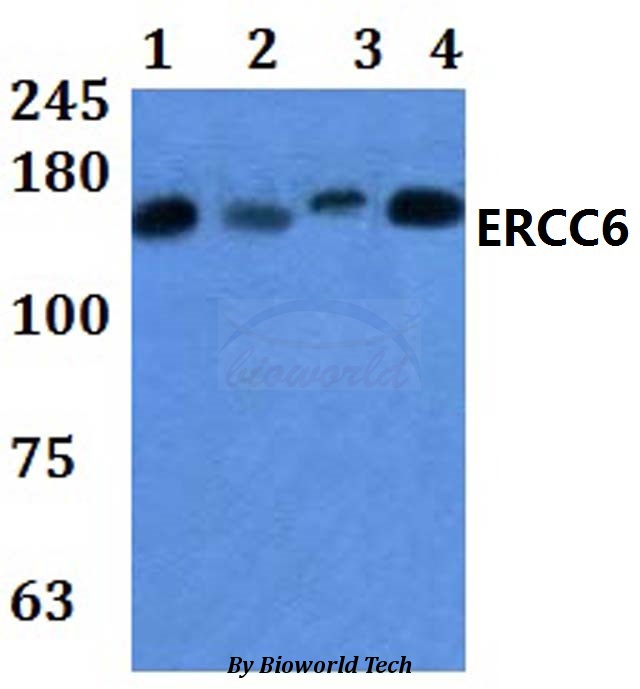Product Name :
ERCC6 polyclonal antibody Background :
Nucleotide excision repair of DNA lesions occurs more rapidly and at a higher frequency on the template, or the transcribed, strand of DNA and to a much lesser extent on the coding, or the non-transcribed, strand or on transcriptionally inactive DNA. CSA and CSB are two related genes that are responsible for directing this preferential DNA repair pattern, known as transcriptional-repair coupling. Cells from patients with the UV-sensitive nucleotide excision repair disorder Cockayne's syndrome (CS) have specific mutations affecting these genes and results in defects of the preferential repair on the transcribed strand of activated genes. CSA is a protein that belongs in the "WD-repeat" family of proteins. CSB, which is also designated excision repair cross-complementing protein-6 (ERCC-6), is the homolog of the yeast Rad26 protein. CSB belongs in the SWI/SNF family of proteins as it contains helicase motifs and ATPase activity. Product :
Rabbit IgG, 1mg/ml in PBS with 0.02% sodium azide, 50% glycerol, pH7.2 Storage&Stability :
Store at 4°C short term. Aliquot and store at -20°C long term. Avoid freeze-thaw cycles. Specificity :
ERCC6 polyclonal antibody detects endogenous levels of ERCC6 protein. Immunogen :
A synthetic peptide corresponding to residues in Human ERCC6. Conjugate :
Unconjugated Modification :
Unmodification
ERCC6 polyclonal antibody Background :
Nucleotide excision repair of DNA lesions occurs more rapidly and at a higher frequency on the template, or the transcribed, strand of DNA and to a much lesser extent on the coding, or the non-transcribed, strand or on transcriptionally inactive DNA. CSA and CSB are two related genes that are responsible for directing this preferential DNA repair pattern, known as transcriptional-repair coupling. Cells from patients with the UV-sensitive nucleotide excision repair disorder Cockayne's syndrome (CS) have specific mutations affecting these genes and results in defects of the preferential repair on the transcribed strand of activated genes. CSA is a protein that belongs in the "WD-repeat" family of proteins. CSB, which is also designated excision repair cross-complementing protein-6 (ERCC-6), is the homolog of the yeast Rad26 protein. CSB belongs in the SWI/SNF family of proteins as it contains helicase motifs and ATPase activity. Product :
Rabbit IgG, 1mg/ml in PBS with 0.02% sodium azide, 50% glycerol, pH7.2 Storage&Stability :
Store at 4°C short term. Aliquot and store at -20°C long term. Avoid freeze-thaw cycles. Specificity :
ERCC6 polyclonal antibody detects endogenous levels of ERCC6 protein. Immunogen :
A synthetic peptide corresponding to residues in Human ERCC6. Conjugate :
Unconjugated Modification :
Unmodification
-
 Western blot (WB) analysis of ERCC6 polyclonal antibody at 1:500 dilution Lane1:HEK293T whole cell lysate Lane2:Raw264.7 whole cell lysate Lane3:H9C2 whole cell lysate Lane4:HELA whole cell lysate
Western blot (WB) analysis of ERCC6 polyclonal antibody at 1:500 dilution Lane1:HEK293T whole cell lysate Lane2:Raw264.7 whole cell lysate Lane3:H9C2 whole cell lysate Lane4:HELA whole cell lysate
Bioworld Biotech only provide peptides for our antibodies and do not provide additional peptide customization services.
Price/Size :
USD 368/1mg/vial
Tips:
For phospho antibody, we provide phospho peptide(0.5mg) and non-phospho peptide(0.5mg).Describe :
Blocking peptides are peptides that bind specifically to the target antibody and block antibody binding. These peptide usually contains the epitope recognized by the antibody. Antibodies bound to the blocking peptide no longer bind to the epitope on the target protein. This mechanism is useful when non-specific binding is an issue, for example, in Western blotting (WB) and Immunohistochemistry (IHC). By comparing the staining from the blocked antibody versus the antibody alone, one can see which staining is specific; Specific binding will be absent from the western blot or IHC performed with the neutralized antibody.Formula:
Synthetic peptide was lyophilized with 100% acetonitrile and is supplied as a powder. Reconstitute with 0.1 ml DI water for a final concentration of 10 mg/ml.The purity is >90%,tested by HPLC and MS.
Storage:
The freeze-dried powder is more stable. For short time at 2-8°C. For long term storage store at -20°C.
Note :
This product is for research use only (RUO only). Not for use in diagnostic or therapeutic procedures.
 ERCC6 polyclonal antibody
ERCC6 polyclonal antibody  Datasheet
Datasheet COA
COA MSDS
MSDS SHIP
SHIP